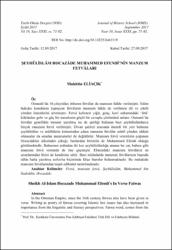| dc.contributor.author | Eliaçık, Muhittin | |
| dc.date.accessioned | 2021-01-14T18:22:02Z | |
| dc.date.available | 2021-01-14T18:22:02Z | |
| dc.date.issued | 2017 | |
| dc.identifier.issn | 1308-5298 | |
| dc.identifier.issn | 2148-4260 | |
| dc.identifier.uri | https://app.trdizin.gov.tr/makale/TWpZME5EYzJOZz09 | |
| dc.identifier.uri | https://hdl.handle.net/20.500.12587/14001 | |
| dc.description.abstract | Osmanlı'da 16.yüzyıldan itibaren fetvâlar da manzum hâlde verilmiştir. İslâm hukuku konularını kapsayan fetvâların manzum hâlde de verilmesi dil ve edebî yönden önemlerini artırmıştır. Fetvâ kelimesi yiğit, genç, kavî anlamındaki 'fetâ' kökünden gelir ve güç bir meselenin güçlü bir cevapla çözümünü anlatır. Osmanlı'da fetvâlar genellikle mensur yazılmış ise de şairliği bulunan bazı şeyhülislâmlarca birçok manzum fetvâ verilmiştir. Divan şairleri arasında önemli bir yeri bulunan şeyhülislâm ve müftülerin kaleminden çıkan manzum fetvâlar edebî yönden iddialı olmasalar da sıradan manzumeler de değildirler. Manzum fetvâ verenlerin çoğunun Hocazâdeler ailesinden çıktığı, bunlardan birisinin de Muhammed Efendi olduğu görülmektedir. Babasının ardından iki kez şeyhülislâmlığa atanan bu zat, babası gibi manzum fetvâ vermede de öne geçmiştir. Elimizdeki manzum fetvâların en uzunlarından birisi de kendisine aittir. Bazı nüshalarda manzum fetvâlarının başında sülüs hatla yazılmış serlevha biçiminde klişe ibareler bulunmaktadır. Bu makalede manzum fetvâlarından tespit edilenler tanıtılmaktadır | en_US |
| dc.description.abstract | In the Ottoman Empire, since the 16th century fetwas also have been given in verse. Writing as poetry of fatwas covering Islamic law issues has also increased in importance from the linguistic and literary perspectives. Fatwa word, comes from the root feta in the brave, young, strong sense and it’s solution with a strong answer to a difficult problem. Although fatwas usually were written in the form of prose in the Ottoman Empire, by some sheikhulislams also were given as poetry. Poetry fatwas which were written by shaykh al-Islam and muftis which are important places among Divan poets, they aren't ordinary poems though they aren't pretentious as literary value. Most of the poetry fatwas came from the Hocazade family; and one of them is Hocazade Muhammad Effendi. This person who has been appointed to the Meshikhat twice after his father, has also come forward for giving poetry fatwa like his father. One of the longest present poetry fatwas is his. In some manuscript, there are stereotypes at the head of his poetry fatwas. In this article his poetry fatwas which was detected are introduced | en_US |
| dc.language.iso | tur | en_US |
| dc.rights | info:eu-repo/semantics/openAccess | en_US |
| dc.subject | Tarih | en_US |
| dc.title | ŞEYHÜLİSLÂM HOCAZÂDE MUHAMMED EFENDİ’NİN MANZUM FETVÂLARI | en_US |
| dc.title.alternative | Sheikh Al-Islam Hocazade Muhammad Efendi’s In Verse Fatwas | en_US |
| dc.type | article | en_US |
| dc.identifier.volume | 10 | en_US |
| dc.identifier.issue | 31 | en_US |
| dc.identifier.startpage | 71 | en_US |
| dc.identifier.endpage | 82 | en_US |
| dc.relation.journal | Tarih Okulu Dergisi | en_US |
| dc.relation.publicationcategory | Makale - Ulusal Hakemli Dergi - Kurum Öğretim Elemanı | en_US |
















